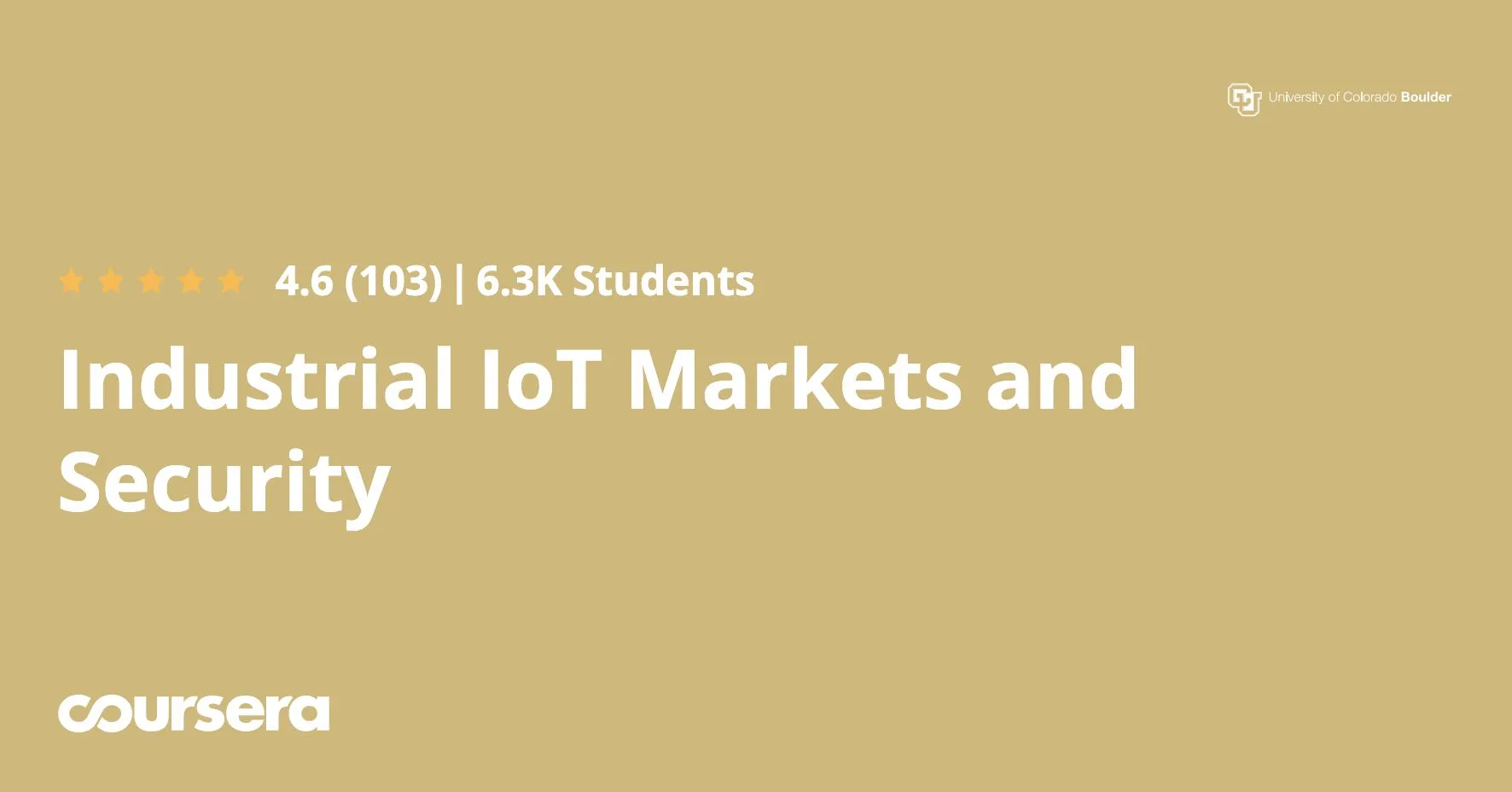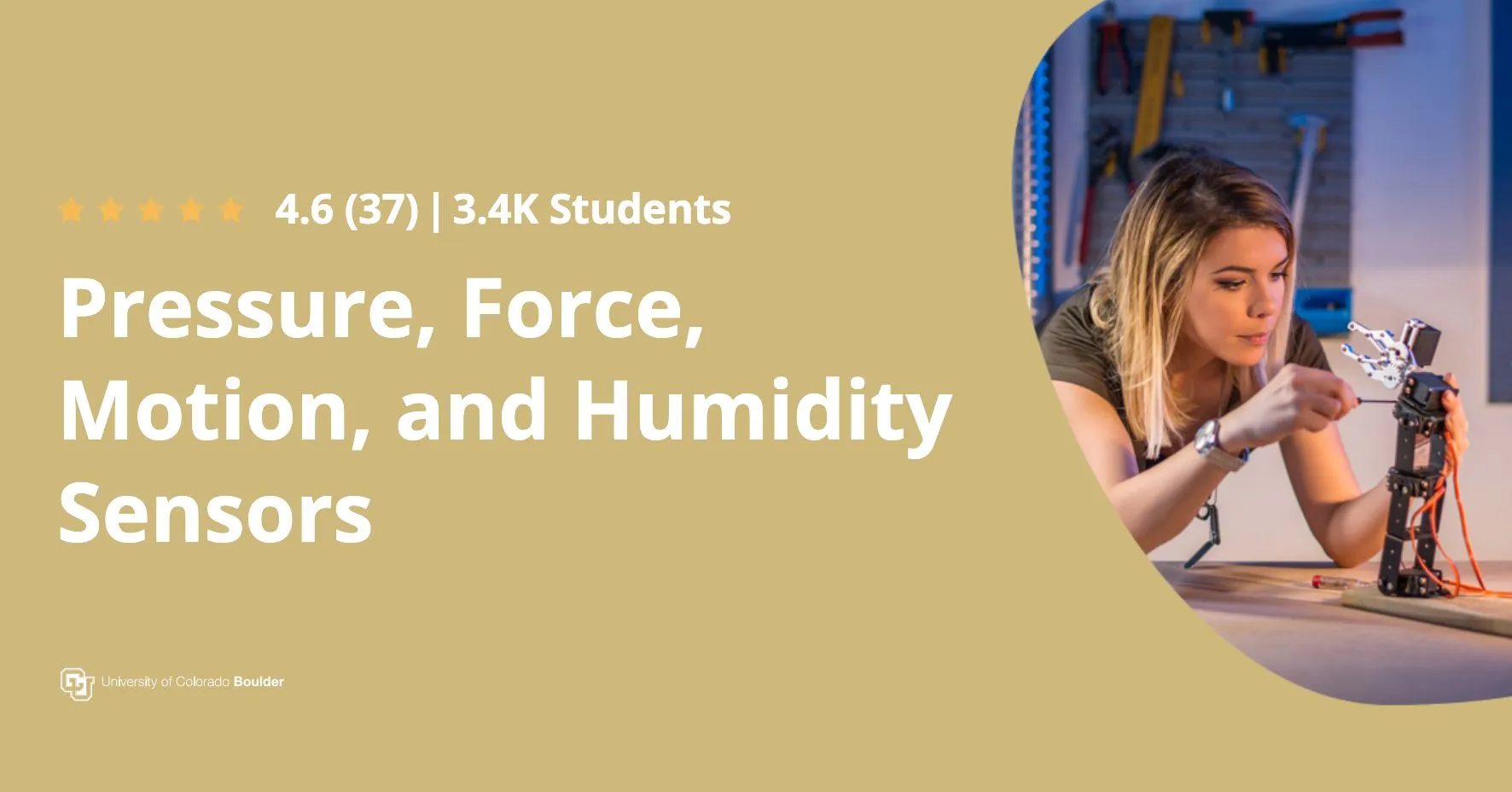
Industrial IoT Markets and Security 
This course, ECEA 5385, is part of CU Boulder's Master of Science in Electrical Engineering degree and focuses on the industrial Internet of Things (IoT) markets and security. Students will gain an understanding of the current and future IoT markets and the security challenges associated with them. ▼
ADVERTISEMENT
Course Feature
![]() Cost:
Cost:
Free
![]() Provider:
Provider:
Coursera
![]() Certificate:
Certificate:
No Information
![]() Language:
Language:
English
![]() Start Date:
Start Date:
Self Paced
Course Overview
❗The content presented here is sourced directly from Coursera platform. For comprehensive course details, including enrollment information, simply click on the 'Go to class' link on our website.
Updated in [March 06th, 2023]
This course provides an overview of the industrial Internet of Things (IoT) markets and security. It covers the fundamentals of industrial IoT, including the different types of industrial IoT, the different types of industrial IoT security, and the different types of industrial IoT applications. It also covers the different types of industrial IoT networks, the different types of industrial IoT protocols, and the different types of industrial IoT analytics.
Industrial IoT Markets and Security is a course designed to provide an overview of the industrial Internet of Things (IoT) markets and security. It covers the fundamentals of industrial IoT, including the different types of industrial IoT, the different types of industrial IoT security, and the different types of industrial IoT applications. It also covers the different types of industrial IoT networks, the different types of industrial IoT protocols, and the different types of industrial IoT analytics. This course is designed to provide students with an understanding of the industrial IoT markets and security, and how they can be used to create secure and efficient industrial IoT solutions.
[Applications]
This course provides an overview of the industrial Internet of Things (IoT) markets and security.
[Suggestions for Application]
Students who have completed this course can apply their knowledge to develop secure industrial IoT systems. They can use their understanding of the industrial IoT markets to identify potential opportunities and develop strategies to capitalize on them. Additionally, they can use their knowledge of security to ensure that their systems are secure and compliant with industry standards. Finally, they can use their understanding of the industrial IoT markets to develop innovative solutions that meet customer needs.
[Career Paths]
This course provides an overview of the industrial Internet of Things (IoT) markets and security. It covers the fundamentals of industrial IoT, including the different types of industrial IoT systems, their applications, and the security challenges they face.
1. Industrial IoT Engineer: Industrial IoT Engineers are responsible for designing, developing, and maintaining industrial IoT systems. They must have a strong understanding of the different types of industrial IoT systems, their applications, and the security challenges they face. They must also be able to develop and implement solutions to address these challenges. As the industrial IoT market continues to grow, the demand for Industrial IoT Engineers is expected to increase.
2. Industrial IoT Security Analyst: Industrial IoT Security Analysts are responsible for assessing the security of industrial IoT systems and developing strategies to protect them from cyber threats. They must have a deep understanding of the different types of industrial IoT systems, their applications, and the security challenges they face. As the industrial IoT market continues to grow, the demand for Industrial IoT Security Analysts is expected to increase.
3. Industrial IoT Data Scientist: Industrial IoT Data Scientists are responsible for analyzing and interpreting data from industrial IoT systems. They must have a strong understanding of the different types of industrial IoT systems, their applications, and the security challenges they face. They must also be able to develop and implement solutions to address these challenges. As the industrial IoT market continues to grow, the demand for Industrial IoT Data Scientists is expected to increase.
4. Industrial IoT Developer: Industrial IoT Developers are responsible for developing applications and software for industrial IoT systems. They must have a strong understanding of the different types of industrial IoT systems, their applications, and the security challenges they face. They must also be able to develop and implement solutions to address these challenges. As the industrial IoT market continues to grow, the demand for Industrial IoT Developers is expected to increase.
[Education Paths]
This course provides an overview of the industrial Internet of Things (IoT) markets and security. It covers the fundamentals of industrial IoT, including the different types of industrial IoT systems, their applications, and the security challenges they face.
1. Bachelor of Science in Computer Science: This degree program provides students with a comprehensive understanding of computer science, including topics such as programming, software engineering, computer networks, and data structures. It also covers the fundamentals of industrial IoT, such as the different types of industrial IoT systems, their applications, and the security challenges they face. This degree is becoming increasingly popular as the demand for skilled professionals in the industrial IoT sector continues to grow.
2. Master of Science in Industrial IoT: This degree program provides students with a deeper understanding of industrial IoT, including topics such as system design, data analytics, and security. It also covers the latest developments in the field, such as machine learning and artificial intelligence. This degree is becoming increasingly popular as the demand for skilled professionals in the industrial IoT sector continues to grow.
3. Bachelor of Science in Electrical Engineering: This degree program provides students with a comprehensive understanding of electrical engineering, including topics such as circuit design, signal processing, and embedded systems. It also covers the fundamentals of industrial IoT, such as the different types of industrial IoT systems, their applications, and the security challenges they face. This degree is becoming increasingly popular as the demand for skilled professionals in the industrial IoT sector continues to grow.
4. Master of Science in Cybersecurity: This degree program provides students with a comprehensive understanding of cybersecurity, including topics such as cryptography, network security, and malware analysis. It also covers the fundamentals of industrial IoT, such as the different types of industrial IoT systems, their applications, and the security challenges they face. This degree is becoming increasingly popular as the demand for skilled professionals in the industrial IoT sector continues to grow.
Pros & Cons

Real examples of security problems and countermeasures

persuasive and informative videos

comprehensive and handson experience

comprehensive materials

interesting content

wellconducted and organized

deep review in security

informative and provide insights.

Laundrylist style of information

not deep knowledge of IIoT usecases

promotional corporate videos

quite technical in parts.
Course Provider

Provider Coursera's Stats at AZClass
Industrial IoT Markets and Security is part of the CU Boulder Master of Science in Electrical Engineering degree with a focus on Industrial IoT Markets and Security. Learners gain insight into emerging market and technology trends in the field of Industrial IoT. This includes learning about Industry 4.0, platforms, software and services, and application areas. Learners can learn how to use the content of this course to develop their engineering skills. This includes learning about operating systems, networking and wireless communication protocols, and computer security.
Discussion and Reviews
0.0 (Based on 0 reviews)
Explore Similar Online Courses

Logo Design: Symbolism in Nature

SEO Fundamentals Course with Greg Gifford

Python for Informatics: Exploring Information

Social Network Analysis

Introduction to Systematic Review and Meta-Analysis

The Analytics Edge

DCO042 - Python For Informatics

Causal Diagrams: Draw Your Assumptions Before Your Conclusions

Whole genome sequencing of bacterial genomes - tools and applications

Pressure Force Motion and Humidity Sensors

Appliance Testing Fundamentals


Start your review of Industrial IoT Markets and Security